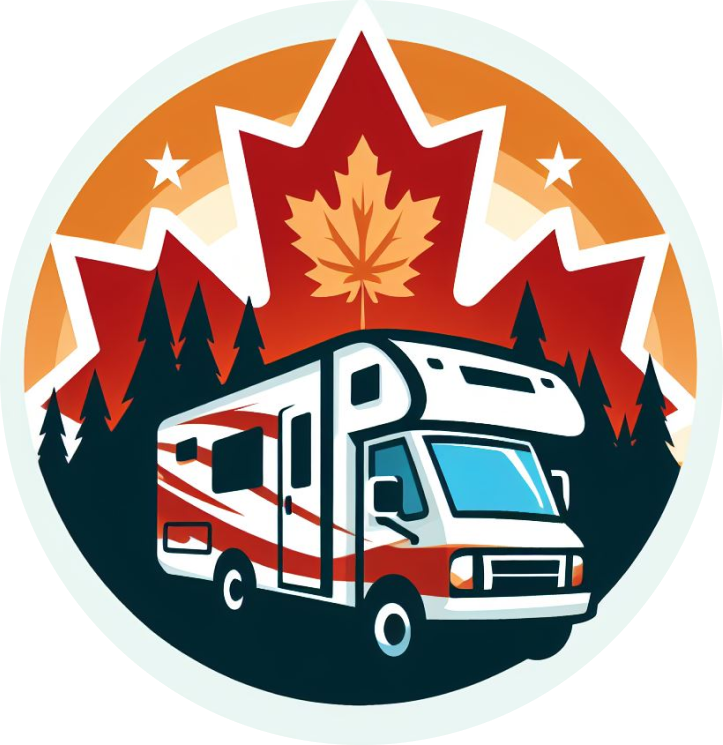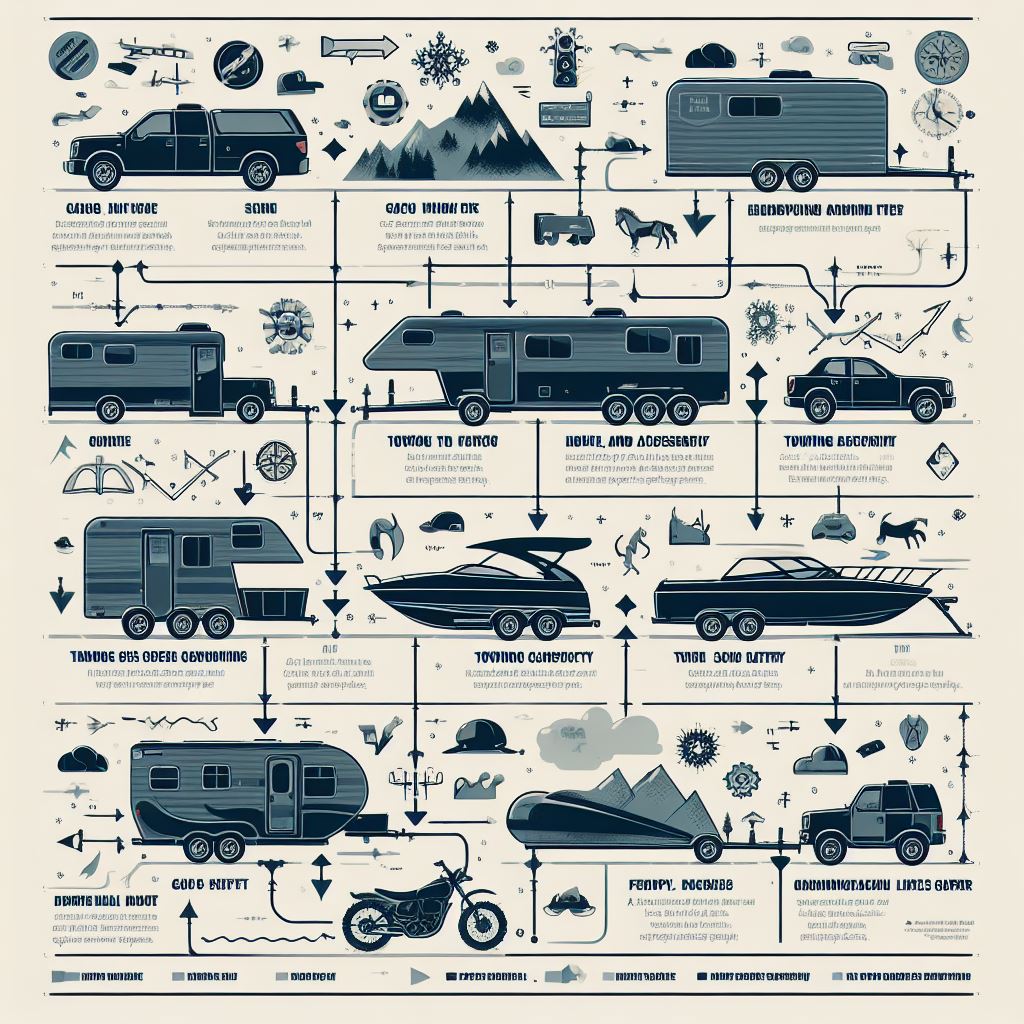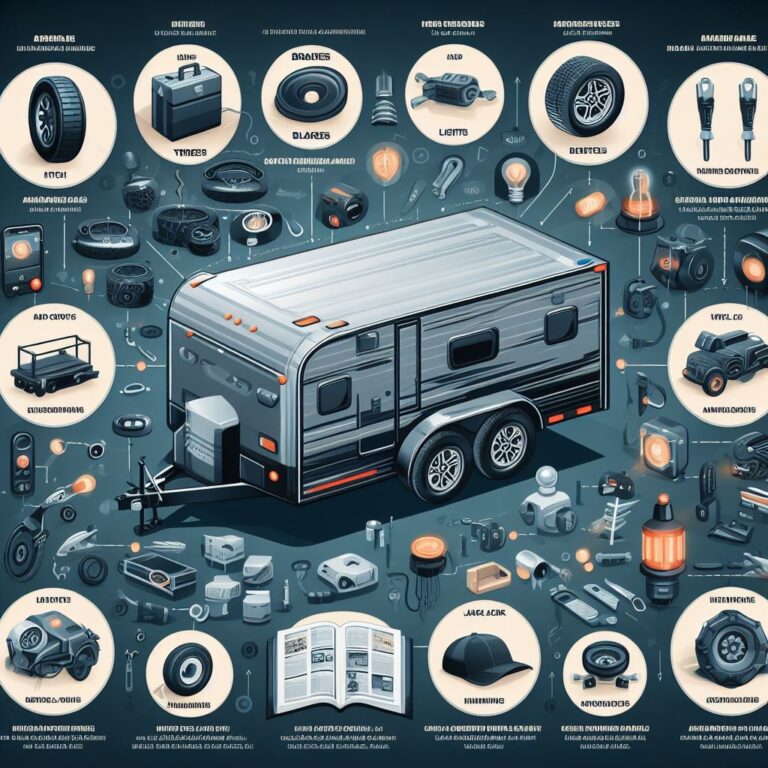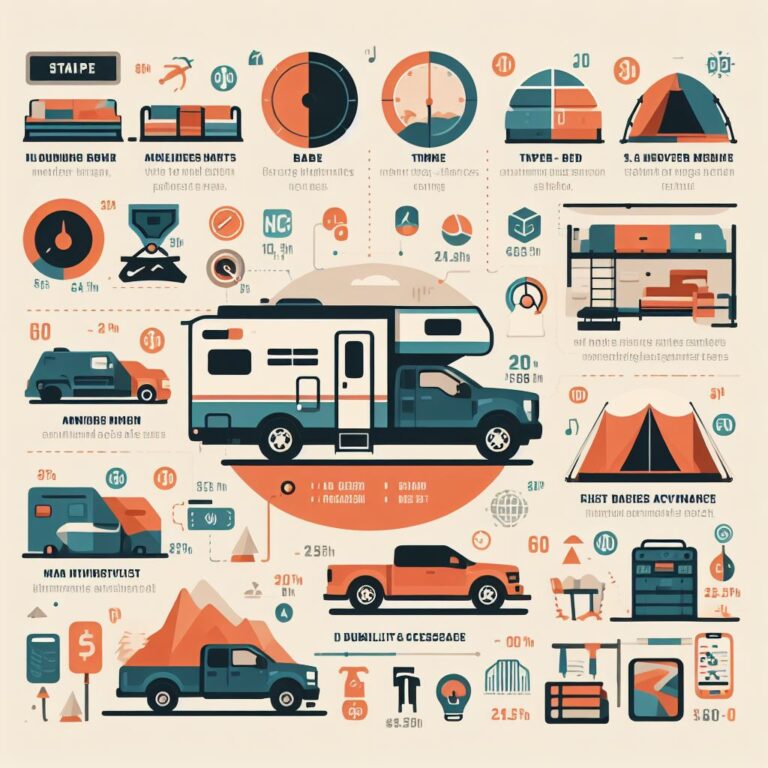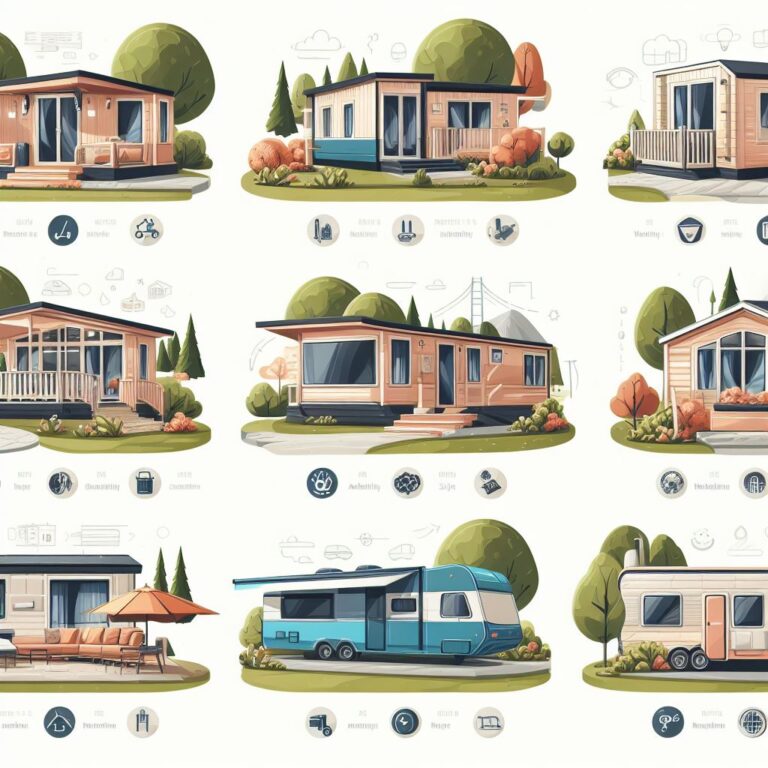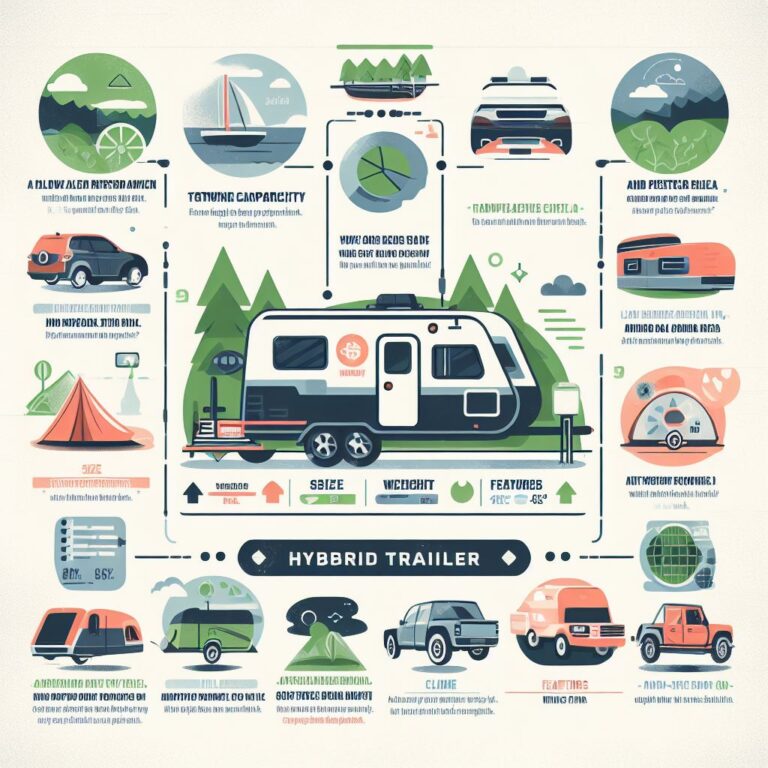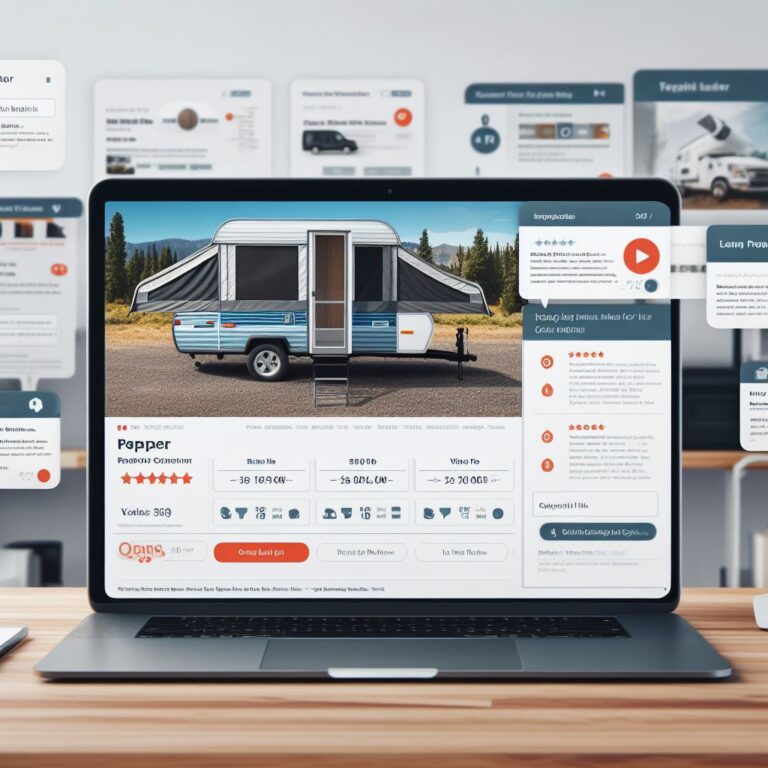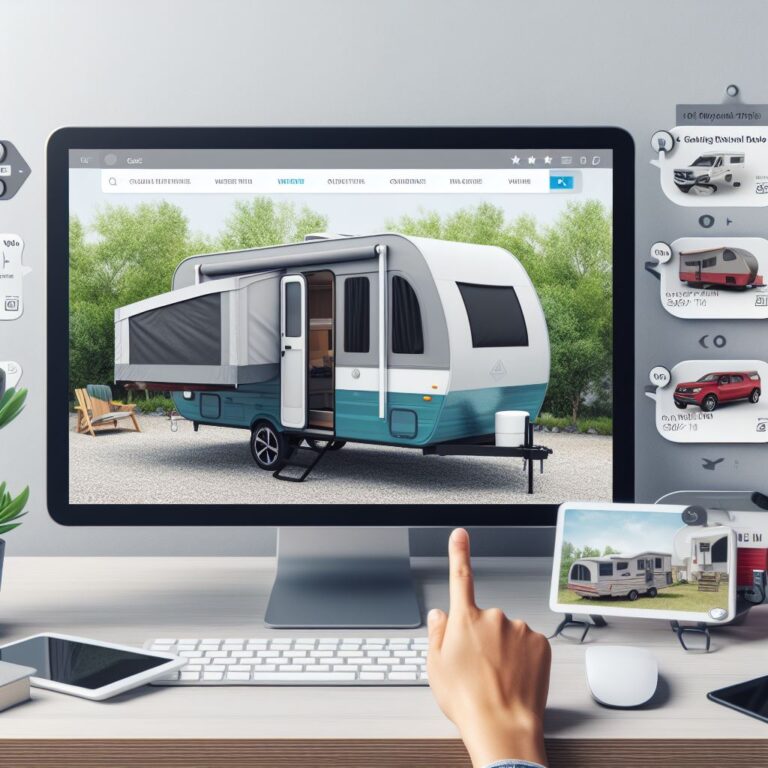How To Choose Fifth Wheel Trailer $45,000 – $160,000 Sleeps up to 8 6.4 to12.2 M(21-40 FT)
Understanding the Basics of Fifth-Wheel Trailers
A fifth-wheel trailer is a unique type of towable RV that offers a variety of benefits to enthusiastic travelers and outdoor lovers. Distinguished by its raised forward section and a hitch setup that connects to the bed of a pickup truck, fifth-wheel trailers provide a high level of stability on the road, often translating to an easier and smoother towing experience. This makes them a preferred choice among long-time RVers for extensive trips, plus their impressive size accommodates all the modern-day luxuries of a home.
An increase in living space is one of the most persuasive attributes of these trailers. Most fifth-wheel trailers have multiple slide-outs, making the interior comparatively more spacious than other RV types. They often include a separate bedroom, full-sized bathrooms, and large kitchen and living areas, allowing for a comfortable living and sleeping arrangement. Though larger in size, these trailers generally provide better fuel efficiency than motorhomes, making them a cost-effective option for long-term travel. Despite their myriad benefits, it’s important to consider the requirement of a suitable tow vehicle while exploring fifth-wheel options, considering their hitch setup.
• Fifth-wheel trailers are known for their hitch setup that connects to the bed of a pickup truck, providing a high level of stability.
• They offer an easier and smoother towing experience, making them ideal for long-term RVers.
• These trailers come with all the modern-day luxuries of a home, including separate bedrooms, full-sized bathrooms, and large kitchen and living spaces.
• The use of multiple slide-outs in most fifth-wheel trailers allows for more interior space than other types of RVs.
• Despite their larger size, they generally provide better fuel efficiency than motorhomes. This makes them a cost-effective option for long-term travel.
• One important factor to consider when looking at fifth-wheel options is the requirement of a suitable tow vehicle due to their specific hitch setup.
Identifying Your Budget Range for an RV Purchase
Determining your budget for a recreational vehicle (RV) purchase requires a careful evaluation of various factors. Firstly, you should consider your monthly disposable income which will largely guide your spending limit. This would account for your monthly savings after deducting all your fixed and variable expenses. Potential RV buyers often make the mistake of underestimating the total cost of owning an RV when setting their budget. This results in financial strain and the inability to sustain the RV lifestyle over time.
Therefore, your budget should be broad enough to accommodate not only the initial purchase price but also the long-term costs associated with RV ownership. These additional costs include insurance, maintenance, storage, and operational costs such as fuel and camping fees. By factoring in these projected costs, you will be able to arrive at a realistic budget that can support your dream of owning an RV without causing financial stress. There are also financing options available for prospective RV buyers which can help break down the cost over a period of time, but these options should also be considered in light of your ongoing budget.
When setting your budget for an RV purchase, here are some important factors to consider:
• Monthly Disposable Income: The amount of money you have left after paying all fixed and variable expenses should guide your spending limit.
• Total Ownership Cost: Don’t underestimate the total cost of owning an RV. This includes not only the initial purchase price but also long-term costs such as insurance, maintenance, storage, fuel and camping fees.
• Financing Options: There are several financing options available that can help spread out the cost over a period of time. However, these should be considered in light of your ongoing budget to avoid financial strain.
In conclusion, understanding these key points will aid in identifying a realistic budget range for purchasing an RV. By doing so, you can enjoy the benefits of RV ownership without causing financial stress or compromising on your lifestyle needs.
The Significance of Size in Selecting Your Mobile Home
When choosing a mobile home, one cannot undermine the paramount significance of size. Deciding on the right size ties directly to your level of comfort and how convenient the overall experience will be. It can determine the storage space, living quarters, and even where you can park or travel. This critical factor, however, largely depends on the needs of individual buyers. Some may require larger, residential-style trailers for extensive travel or full-time living, while others may prefer small, compact trailers for weekend getaways.
Size has a direct impact on several other considerations like the towing vehicle you will need, as well as fuel economy. A larger, weightier trailer will naturally necessitate a more powerful vehicle to tow it, and also consume more fuel, both factors that add to the overall cost. On the other hand, a smaller mobile home, while being easier to handle and less costly in terms of fuel and maintenance, may compromise on space and luxury. It is essential to find a balance that suits your lifestyle, preferences, and, of course, your budget. This is where the significance of size in choosing your mobile home emerges, providing a key foundation for making other related decisions.
To further elaborate on the significance of size in selecting your mobile home, below are some key points to consider:
• The number of occupants: A larger family would require more space for comfort and convenience. Hence, a bigger mobile home might be necessary. On the other hand, if you’re single or a couple without kids, a smaller trailer could suffice.
• Your lifestyle: If you plan on using your mobile home for extended travels or full-time living, opting for a larger one with residential-style amenities may be beneficial. However, if it’s primarily intended for occasional use or short trips, a compact model will do.
• Storage needs: Bigger trailers typically offer more storage space which is crucial if you have many belongings to carry along during your travel.
• Towing vehicle capacity: Owning a large trailer requires owning an equally powerful towing vehicle as well. Remember that this adds up to the initial cost and maintenance expenses over time.
• Fuel economy: Larger homes consume more fuel due to their weightier build compared to smaller ones which are lighter hence economical on fuel consumption.
• Parking considerations: Depending on where you intend to park or travel frequently can also influence your choice of size. Some locations may have restrictions against oversized vehicles while others might accommodate them comfortably.
In conclusion, understanding these factors provides clarity as we make decisions about our ideal mobile home’s size—each playing an integral role in shaping our overall experience with it.
Optimum Occupancy: The Importance of Sleeping Capacity
When choosing a fifth-wheel trailer, a key consideration is the sleeping capacity. Size matters, not just in terms of the physical dimensions of the trailer, but also in relation to the number of people it can accommodate. The sleeping capacity of a trailer refers to the number of people who can comfortably sleep inside it. This detail is often overlooked by buyers, leading to discomfort and inconvenience on the road. It’s crucial to remember that a holiday is meant to provide rest and relaxation, so your mobile home must be spacious enough to ensure comfortable slumber for all occupants.
The sleeping capacity of trailers can range from two sleeper models, ideal for couples, to ten sleeper models, meant for larger families or groups. Higher-end models may even feature separate bedrooms, while more budget-friendly models use convertible dinettes and fold-out sofas to maximize space. The right balance must be struck between available space and the need for comfort. Determining the optimum occupancy for your needs can greatly enhance your RV experience, ensuring convenience and comfort for all travelers.
• The sleeping capacity of a trailer is often overlooked by buyers, leading to discomfort and inconvenience on the road.
• A holiday is meant to provide rest and relaxation, so your mobile home must be spacious enough to ensure comfortable slumber for all occupants.
• Trailers can range from two sleeper models, ideal for couples, to ten sleeper models, meant for larger families or groups.
• Higher-end models may feature separate bedrooms while more budget-friendly models use convertible dinettes and fold-out sofas to maximize space.
• Striking the right balance between available space and comfort is crucial in choosing a trailer.
• Determining the optimum occupancy based on your needs can greatly enhance your RV experience.
In addition to considering sleeping capacity when purchasing a fifth-wheel trailer, it’s also important that you take into account other factors such as storage capacity, towing weight limits and fuel efficiency. These features will have an impact on both your travel experience and overall costs.
For instance:
● Storage capacity – If you plan on taking long trips or living full-time in your RV, ample storage space will be necessary. This includes room for clothing, food supplies as well as camping gear.
● Towing weight limits – Ensure that your vehicle has sufficient towing capacity for the selected trailer model.
● Fuel efficiency – Larger trailers tend not only heavier but also less aerodynamic which could result in higher fuel consumption.
By keeping these points in mind when shopping around, you’ll be better prepared to find a fifth-wheel trailer that perfectly suits your lifestyle needs without compromising comfort or convenience during travels.
Decoding Dimensions: The Relevance of Trailer Length
Understanding the dimensions of a trailer, particularly its length, is essential when deciding on an RV purchase. The length of a trailer is not just about managing the sheer physical space it occupies. It significantly influences several other factors such as the vehicle’s manoeuvrability, parking space requirements, and storage capacity. Thus, it plays an important role in shaping a buyer’s entire experience of owning and using an RV.
For instance, a longer trailer typically provides more living and storage space, and is perfect for those planning on full-time RV living or long trips. However, it also entails certain restrictions. Some campgrounds, roads, and bridges have limitations regarding the vehicle length. In contrast, shorter trailers offer greater flexibility for travel, being easier to handle on the road, and less restrictive when it comes to parking or accessing different locations. However, they might mean compromising on some interior space. It’s a delicate balance buyers must strike between convenience and comfort.
In order to make an informed decision, buyers should consider the following points:
• The longer the trailer, the more living and storage space it provides. This may be ideal for individuals who plan on full-time RV living or those embarking on extended trips.
• Longer trailers may face restrictions in certain areas. Some campgrounds, roads, and bridges have limitations regarding vehicle length which can limit your options for travel routes and overnight stays.
• Shorter trailers are generally easier to manoeuvre. Their compact size makes them less challenging to handle on roads, especially in tight turns or narrow lanes.
• Parking a shorter trailer tends to be simpler due to its size. It’s also less likely you’ll encounter restrictions when trying to access different locations such as city centres or smaller campsites.
• However, opting for a shorter trailer might mean compromising on interior space. While they offer greater mobility and flexibility, their living and storage spaces are typically smaller than those of longer trailers.
In summary, understanding the implications of trailer length is crucial before making an RV purchase decision. Buyers must balance between convenience – ease of driving, parking and location accessibility – against comfort provided by additional living and storage space.
Assessing the Value for Money in High-End Trailers
When delving into the world of high-end trailers, it’s essential to ensure that your significant investment is justified. The phrase ‘value for money’ has different implications for different individuals; while for one person it might mean getting the largest trailer that their budget allows, for others it represents the balance between cost, comfort, and added features.
The comprehensive evaluation of high-end trailers involves considering factors such as structural quality, durability, design, additional features such as appliances and furniture, and its overall performance. For instance, an expensive trailer with state-of-the-art amenities, robust construction, and superior on-road handling provides a better value for money compared to a less pricey option that may require frequent repairs and maintenance. This value assessment helps potential buyers make an informed decision based on their individual needs and budget constraints.
When assessing the value for money in high-end trailers, it’s critical to consider several key factors:
• Structural Quality: This refers to how well-built and sturdy the trailer is. High-quality materials and construction methods are usually indicative of a more durable and long-lasting product.
• Durability: A high-end trailer should be able to withstand harsh weather conditions, rough terrains, heavy use, and time. It should not require frequent repairs or replacements.
• Design: The design of the trailer also plays a significant role in its overall value. It should be functional, aesthetically pleasing, and ergonomically designed for comfortable living on the road.
• Additional Features: These can range from appliances like refrigerators or air conditioners to furniture such as beds or sofas. These added amenities can significantly enhance your comfort levels while traveling.
• Performance: A good quality trailer should perform exceptionally well on-road. It must have superior handling capabilities that ensure safe driving experience even at high speeds or over challenging terrains.
The most expensive option isn’t always necessarily the best one; instead look for a balance between cost-effectiveness and quality when purchasing a high-end trailer.
In conclusion:
– Understand what ‘value for money’ means personally before making an investment
– Focus on structural quality, durability, design features along with additional amenities when evaluating options
– Prioritize performance over price – cheaper trailers may end up costing more due to regular maintenance needs
– Consider both initial purchase price as well as potential future costs (maintenance/repairs) in decision-making process
Key Features to Look for in a Family-Sized Trailer
When acquiring a family-sized trailer, valuable features merit consideration to ensure an exceptional road trip experience. One such feature is the spaciousness of the interior. A well-designed orientation of rooms, including sleeping quarters, the living area, and a functional kitchen, enhances comfort for everyone on board. Adequate storage for clothes, gear, and food is essential, as clutter can quickly become a nuisance on the road.
Equally important is the robustness of the utilities system, including electricity, water, and propane. Reliable heating, cooling, and ventilation ensure comfort in varying climates. Sophisticated kitchen appliances, like a versatile stove, large fridge, and microwave, make meal preparation a breeze. Also, ensure that the bathroom is complete with a shower and toilet. An easy to clean and maintain interior is also a great feature in any family-sized trailer. It is crucial to remember that while looking for these features, families must balance their desires with their budget.
Here are some key features to consider when purchasing a family-sized trailer:
• Spacious Interior: Look for a well-planned layout with enough room in the sleeping quarters, living area, and kitchen. This will ensure comfort for everyone on board during your road trips.
• Adequate Storage: The trailer should have sufficient storage space for clothes, gear, and food. It’s important to avoid clutter as it can quickly become an issue while traveling.
• Robust Utilities System: A reliable utilities system is crucial. This includes electricity, water supply, and propane gas systems that run smoothly without any hitches.
• Heating & Cooling Systems: Depending on where you plan to travel or camp out, heating and cooling systems may be necessary. Make sure these systems are reliable so they can handle varying climates efficiently.
• Kitchen Appliances: Sophisticated kitchen appliances like a versatile stove, large fridge and microwave make meal preparation easier while on the road.
• Bathroom Facilities: Ensure the bathroom is complete with a shower and toilet facilities.
• Easy Maintenance & Cleaning: An interior that’s easy to clean and maintain makes life on the road much simpler. Opt for materials that resist dirt build-up or are easily wiped down.
Remember that all of these factors must align with your budget constraints. While many features might seem appealing initially but could add significantly to your costs both upfront at purchase time as well as down the line in terms of maintenance expenses.
Comparing Models: Top Trailers in Your Budget Range
Choosing the right RV can be a daunting task, especially due to the vast array of models available. It becomes all the more intricate when trying to find the top trailers that align with your budgetary constraints. The divergent spectrum of trailers encompasses basic, mid-range, and high-end varieties. For those working within a tight budget, numerous manufacturers offer basic models that, while lacking some of the luxuries found in pricier models, still provide all necessities. Some top trailers within a lower budget range include the Forest River Alpha Wolf, Keystone Passport SL Series, and the Jayco Flight SLX.
Delving into the mid-range, customers will find trailers that offer a balance between affordability and comfort. These models often include added luxuries such as spacious bathrooms, larger living areas, or modern appliances. Some favorite mid-range trailers on the market are Grand Design Reflection, Keystone Cougar Half-Ton, and Jayco Eagle HTX. And, for those willing to splurge, high-end fifth-wheel trailers represent the pinnacle of RV life. These trailers, exemplified by the Keystone Montana series or Tiffin’s Allegro Bus, offer luxurious living spaces, advanced technology, and ample room. Remember, it is essential to meticulously compare each model and align their features with your preferences and budget to make an astute trailer investment.
In the lower budget range, some of the top trailers include:
• The Forest River Alpha Wolf: This model is well-known for its durability and spacious interiors. Though it doesn’t have all the luxury features found in pricier models, it provides all basic necessities for a comfortable trip.
• Keystone Passport SL Series: Known for its lightweight design and fuel efficiency, this trailer also offers plenty of storage space.
• Jayco Flight SLX: This model boasts an aerodynamic design that makes it easy to tow. It also has a roomy interior with various floor plans available.
Moving on to mid-range trailers, some popular choices are:
• Grand Design Reflection: Offering more comfort than basic models, this trailer comes with added luxuries like larger living areas and modern appliances.
• Keystone Cougar Half-Ton: A step up from the Passport series, this model features enhanced insulation for year-round use and a more spacious bathroom area.
• Jayco Eagle HTX: This fifth-wheel option includes upgraded amenities such as solid hardwood cabinetry and high-definition TVs.
For those willing to splurge on high-end fifth-wheel trailers:
• Keystone Montana series: Representing luxury RV life at its finest, these trailers offer advanced technology like central vacuum systems and heated floors along with ample living spaces.
• Tiffin’s Allegro Bus : Another luxurious choice offering upscale finishes such as handcrafted cabinetry and porcelain tile flooring. Also equipped with state-of-the-art technology including multiple flat-screen TVs and an integrated whole-coach water filtration system.
Remember:
It’s essential to compare each model meticulously – consider their individual features alongside your preferences before making any investment decision regarding RVs or travel trailers.
Tips for Making the Most of Your Trailer Investment
Maximising the value of your trailer investment goes beyond the initial purchase, requiring strategic planning and attention to detail. Drawing up a comprehensive maintenance schedule is one such way to ensure the longevity of your fifth wheel trailer. Regularly serviced systems, be it water, plumbing, electrical, or HVAC, can prevent major repairs down the line, saving you unexpected costs and maximizing the life of your investment.
Moreover, another critical factor in getting the most out of your investment is using the trailer regularly. An unused trailer will invariably deteriorate faster, while frequent utilization could help identify potential issues before they become major problems. Whether you are exploring the diverse Canadian landscape or embarking on a cross-country adventure, don’t shy away from putting your RV to use. Remember, your fifth-wheel trailer isn’t just a financial investment but an investment in a lifestyle of freedom and flexibility.
Here are a few tips to help you make the most of your trailer investment:
• Develop a Maintenance Schedule: Regular maintenance is key to prolonging the life and functionality of your trailer. This includes regular checks on all systems such as water, plumbing, electrical, and HVAC. It’s advisable to draw up a comprehensive maintenance schedule that outlines when each system needs servicing.
• Use Your Trailer Regularly: The more frequently you use your trailer, the less likely it is to deteriorate quickly. Regular usage can also help identify potential issues before they become major problems.
• Invest in Quality Parts and Accessories: Using high-quality parts for repairs or upgrades not only enhances the performance of your RV but also adds value should you decide to sell in future.
• Insure Your Investment: Protecting your financial investment with an appropriate insurance policy will provide peace of mind in case any unforeseen incidents occur.
• Keep it Clean: Keeping both interior and exterior clean helps prevent wear-and-tear damage while maintaining its aesthetic appeal which could be beneficial if you plan on reselling.
Remember that maximizing the value from your fifth-wheel trailer isn’t just about monetary returns; it’s about enjoying a lifestyle full of freedom, flexibility, adventure – so don’t hesitate to hit the road!
Maintaining Your Fifth-Wheel Trailer for Longevity
Regular maintenance plays a crucial role in extending the lifespan of your fifth-wheel trailer. To ensure longevity, it’s essential to service all mechanical components, such as brakes and tires, in accordance with their recommended schedules. Additionally, the trailer’s exterior needs attention; routine cleaning and timely repair of any damage can prevent long-term issues like rust and mold.
The interior of your trailer also demands careful upkeep. Regular cleaning not only makes your mobile home a more pleasant place to stay, but it also helps to avoid wear and tear. Appliances should be serviced as per manufacturer instructions. In cold Canadian winters, remember to properly winterize water systems to prevent freezing damage. Ultimately, thorough and intentional maintenance will maximize the life of your fifth-wheel trailer.
Here are some key points to consider for maintaining your fifth-wheel trailer:
• Regularly inspect and service the mechanical components of your trailer. This includes brakes, tires, and other moving parts. Ensure that these are serviced according to their recommended schedules.
• Pay attention to the exterior of your trailer. Keep it clean and promptly repair any damage you notice. This can help prevent long-term issues such as rusting or mold growth.
• Maintain the interior of your trailer by cleaning it regularly. A clean environment not only makes for a more pleasant living space but also helps avoid wear and tear on surfaces.
• Service all appliances in accordance with manufacturer instructions. Regular maintenance will ensure they continue working efficiently, saving you money in the long run.
• Remember to winterize water systems during cold Canadian winters properly. Failing to do so could result in freezing damage that is expensive and time-consuming to fix.
In conclusion, thorough maintenance is crucial if you want to extend the life span of your fifth-wheel trailer significantly. It might require some effort, but this proactive approach will save you from costly repairs down the line while ensuring that your mobile home remains comfortable and safe throughout its lifespan.
What is a fifth-wheel trailer?
A fifth-wheel trailer is a type of towable RV that extends over the back of the truck towing it, giving it additional living space. It attaches to the truck via a hitch in the truck bed.
How should I determine my budget range for a fifth-wheel trailer?
Your budget range should be determined by several factors, including your financial situation and the intended use of the trailer. You should consider costs such as initial purchase price, insurance, maintenance, and fuel.
Why is size significant when selecting a fifth-wheel trailer?
The size of your fifth-wheel trailer will determine how much living space you have, how easy it is to tow, and where you can park or camp. Larger trailers often offer more amenities but can be more challenging to manage.
How important is the sleeping capacity of a fifth-wheel trailer?
The sleeping capacity is critical, particularly if you plan on traveling with family or friends. You’ll want to ensure everyone has a comfortable place to sleep.
How does the trailer length impact my choice?
The length of your trailer can affect maneuverability on the road, where you can park, and the amount of living space inside. It’s important to balance size with practicality.
What features should I look for in a family-sized fifth-wheel trailer?
When looking for a family-sized trailer, consider features like the number of beds, the presence of a full kitchen, and ample storage space. You might also want to consider entertainment options, like TV hookups or outdoor cooking areas.
How can I ensure I get value for my money when buying a high-end trailer?
To get value for your money, consider factors like the build quality, the reputation of the manufacturer, the amenities included, and the resale value of the trailer.
How can I compare different fifth-wheel trailer models?
You can compare different trailer models by considering factors like their size, price, features, and reviews from other customers. Comparing these aspects can help you find the trailer that best suits your needs and budget.
What tips could help me make the most of my trailer investment?
Regular maintenance, proper storage, and careful use of the trailer can all help prolong its lifespan. It’s also good to understand your trailer’s warranty and what it covers.
How can I maintain my fifth-wheel trailer for longevity?
Regular maintenance such as checking the tires, brakes, and other systems, as well as cleaning and winterizing the trailer can help extend its lifespan. It’s also important to fix any issues immediately to prevent further damage.
- How To Choose TIPHOPE RV Accessories - February 10, 2024
- How To Choose Joinfworld RV Accessories - February 10, 2024
- How To Choose Conntek RV Accessories - February 9, 2024
